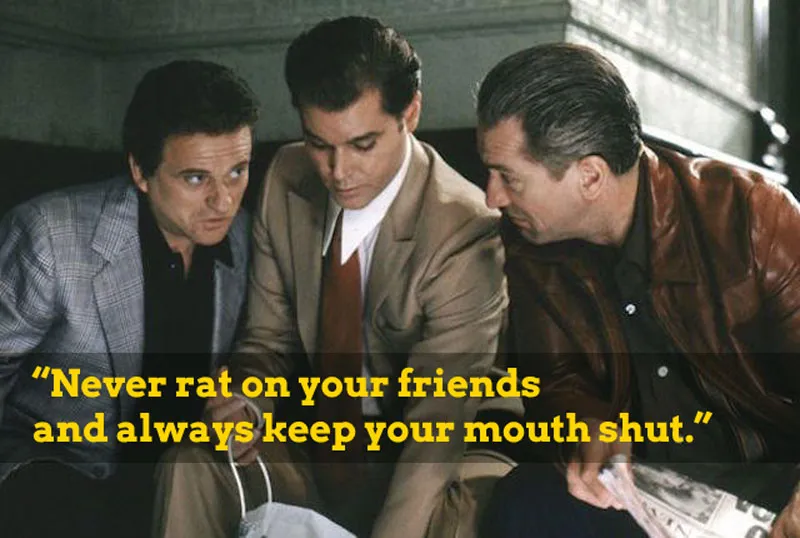7 Startup Legal Lessons from Gangster Movies
Startups are so optimistic about the payoff, they usually ignore the shrapnel. Win large or lose large – that’s just the game though, right? Wrong. That talk is for gangsters, who may follow your ‘fail fast, fail often’ mantra, but certainly can’t mitigate risk, at least not legally. But you can and should be taking advantage of the law every chance you get. Paying attention to the risks of legal negligence or non-compliance can literally make or save your start-up. It’s happened before and it’ll happen again. And even the bad guys agree. Here are seven lines from gangster movies asking you to rethink your attitude toward legal.
Breaking Bad on Trademark Registration

When your product has a uniqueness that’s certain to get noticed, you need to brand that feature or someone else could confuse who would have been your customers. Why else would Cadbury’s fight so fiercely to protect the colour purple, Facebook the word ‘face’ and Levis the positioning of the red label on its jeans? It’s because they know how strong an impact branding has on consumers. The way to ensure you have exclusive rights to commercial use of the brand name, logo, slogan or any other distinguishing feature of your product, you need a trademark registration. If Walter White were allowed, we would urge him to go with Blue Sky. If you already have one as good, you better call Saul.
Gangs of Wasseypur on Terms of Service Agreements

No one’s getting very far in this online game without being straight up with their audience. Because the moment they find out you’re doing something without telling them, be it questionable or not, they’re coming for you. On Facebook, on Instagram, on Twitter. So when you’re doing something with your users’ information, whether following them around the web, sharing it with third-parties or using it in a school computer science project, you better tell them. If it is questionable, telling them isn’t going to save you from the outrage, but it could save you in court, as a Terms of Service & Privacy Policy is a legally-binding document.
Donnie Brasco on Founders’ Agreements

Bleak as it may sound, the business can’t risk you and your co-founders being courteous to each other. The founders need to be on the same page about their ambitions and expectations. Without doing this, you never know if you’re the one who’s going to lose out, regardless of what you’ve done for the business. Just ask Eduardo Saverin. What you need is a water-tight Founders’ Agreement – one that lays strong ground rules; offers clarity on risk and reward – particularly vesting periods of equity; deals with consequences of departure; and contains well-outlined responsibilities and a properly developed vision for the business.
Satya on Patents

What do you call a first-mover advantage that lasts 20 years? Easy. A Patent. It allows you to move so far ahead of the competition, it all but guarantees success. The opportunity to patent software, unavailable in India until last year, now allows even online businesses to exploit this opportunity. And perhaps you’re against patenting because all software is built on other software, your competitors may not share your principles.
Pulp Fiction on Annual Compliances

Starting up a registered business only to ignore the compliance work involved is a bit like leaving fingerprints and ID at the scene of a crime. Penalties for non-compliance can cripple a company, the ones still looking for funding at least. And if you think the government didn't get you the last time, that only increases the chance of you being fined this year. And if the MCA does scrutinise your business, don’t expect sympathy, not even if you disagree with their requirements. After all, the rule makers don’t have to say please.
Don on Tax Returns

So, you’re running a business that collects VAT, service tax, professional tax and deducts tax at source? Those are a lot of returns for a new business. But that’s just how it is. It may seem boring and unnecessary and the procedure may be straight out of the License Raj, but there is no complaining. Think about it as the cost of doing business in a country with bigger problems than bureaucracy. Fall behind on them and you’ll soon have fines to complain about, in addition to the returns.
Goodfellas on Non-Disclosure Agreements

Entrepreneurs often bring early employees on board without an employment agreement, as if they have no confidence in their business. But not every early employee will be a goodfella and keep his mouth shut without an agreement in place. Some will sell or share this information with their network, while others will take your idea and build a large social network out of it. To stop this from happening, you need an employment agreement (it will contain a non-disclosure agreement) in place with every employee.







